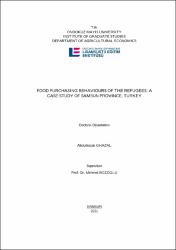Food purchasing behaviours of the refugees:a case study of Samsun province, Turkey
Künye
Ghazal, A. (2021). Food purchasing behaviours of the refugees:a case study of Samsun province, Turkey. (Doktora tezi). Ondokuz Mayıs Üniversitesi, Samsun.Özet
Increasing the number of refugees in the world is important to study refugee’s
behavior. The objectives of the study were to examine the factors influencing food
expenditure, points of purchase choice, and the food security status among Syrian and
Iraqi refugees in Samsun province of Turkey. The data were gathered on the period of
October 2019 – March 2020 from surveys conducted with 252 Syrian and Iraqi
refugees in Samsun province. Person’s correlation (r), Chi-Square, t-test, and ANOVA
tests were used for descriptive analysis of the variables, while factor analysis (FA) and
multiple linear regression were used, to reduce the number of explanatory variables
and to explain influencing factors on food expenditure, points of food purchase, and
food security. The results indicated that average household size was 5 members and
food expenditure on five categories represented 38% of the total household income.
The study also resulted that the local markets were the preferred choice for fresh
vegetables and fruit, supermarkets for meat and dairy products, and markets for cereal
products. The food expenditure of refugee households was dominated by meat,
vegetables, fruit, dairy products, and cereals, respectively. The findings suggested
socio- demographic variables as household size, length of stay in Samsun province,
economic variables as level of income and behavioural variables as purchasing out of
season and wasted amount had significant effects on the food expenditure of refugee
households. Price, product characteristics, and health dimensions seem to be the most
influential factors on store choice of refugees. However, socio-demographic factors as
nationality, gender, marital status, age, and district, economic factors as number of
workers and income level, and behavioral factors as buying off-season and payment
way had influenced on the refugees’ store choices at least for two food categories. The
research findings also showed that 61.8% of refugee households could not access to
enough foods. The influencing factors on food security were determined by sociodemographic variables as nationality, age, level of education, residence period and
district, economic variables as job status and level of income had significant effects on
food security status of refugee households. Consumers should pay attention to healthy
products such as food safety and organic products more than price. Food retailers
should improve marketing strategies taking account into refugees' preferences to fulfill
their desires and needs. In order to improve food security status of the refugees, new
business opportunities together with the improvement of the economic and employment situation should be created. To reduce food insecurity for especially the
most vulnerable refugees, special strategies and programs should be implemented. Dünyada sayıları artan mültecilerin davranışlarının incelenmesi önemlidir. Çalışmanın
amacı, Türkiye'nin Samsun kentindeki Suriyeli ve Iraklı mültecilerin gıda harcamaları,
satın alma noktaları ve gıda güvencelerini etkileyen faktörlerin ortaya konulmasıdır.
Araştırmanın verileri, Samsun İlinden seçilen 252 Suriyeli ve Iraklı sığınmacı
hanehalkı temsilcisiyle Ekim-Mart 2019 - 2020 döneminde yapılan anketlerden elde
edilmiştir. Araştırmada tanımlayıcı analiz yöntemleri olarakl Person's korelason (r),
Ki-Kare, t-testi ve ANOVA testleri, satın alma noktasına etkili faktörlerin
indirgenmesi ve analizinde sırasıyla faktör analizi ve doğrusal regresyon modelinden
yararlanılmıştır. Araştırma sonuçları sığınmacı hanehalkı büyüklüğünün 5 kişi ve
ortalama gelirlerinin 38%’ini gıdaya harcadıklarını göstermektedir. Sığınmacı hane
halklarının gıda harcamalarında sırasıyla et, sebze, meyve, süt ürünleri ve tahıllar
hakimdir. Sığınmacı hanehalklarının taze sebze ve meyveleri mahalle pazarlarından,
et ve süt ürünlerini süpermarketlerden, tahıl ürünlerini ise sığınmacıların
marketlerinden satın almayı tercih ettikleri ortaya konulmuştur. Regresyon model
sonuçları göre sığınmacı hanehalklarının gıda satın alma noktalarına; sosyodemografik değişkenlerden uyruk, cinsiyet, hane halkı büyüklüğü, ikamet süresi,
ekonomik değişkenlerden hanehalkı sayısı ve gelir düzeyi ile davranışsal
değişkenlerden sezon dışı satın alma ve israf edilen gıda miktar değişkenlerinin
istatistiki olarak önemli etkileri söz konusudur. Sığınmacı hanehaklarının gıda satın
alma seçimlerinde en etkili faktörler ise fiyat, ürün özellikleri ve gıda güvenliğidir.
Bununla birlikte, sosyo-demografik faktörlerden uyruk, cinsiyet, medeni durum, yaş
ve ikamet edilen ilçenin, ekonomik faktörlerden işçi sayısı ve gelir düzeyi ile
davranışsal faktörlerden sezon dışı satın alma ve ödeme şekli değişkenlerinin en az iki
gıda kategorisi için sığınmacı hanehalklarının mağaza seçimlerini etkilemektedir.
Bununla birlikte araştırma sonuçları, Samsun'daki sığınmacıların %61,8’inin yeterli
gıdaya erişemediklerini ortaya koymuştur. Sığınmacı hanehaklarının gıda
güvencesini; sosyo-demografik değişkenlerden uyruk, yaş, eğitim düzeyi ve ikamet
süresinin, ekonomik değişkenlerden iş durumu ve gelir düzeyinin istatistiki olarak
önemli etkileri vardır. Sığınmacı tüketiciler, gıda satın alımlarında fiyattan daha fazla
gıdanın güvenli olmasına dikkat etmelidir. Gıda perakendecileri, pazarlama
stratejilerini sığınmacıların ihtiyaç ve taleplerini karşılayacak şekilde
geliştirmelidirler. Türkiye'deki mültecilerin gıda güvenliği statüsünü iyileştirmek için
ekonomik ve istihdam durumunun iyileştirilmesiyle birlikte yeni iş fırsatları
yaratılmalıdır. Özellikle en savunmasız mülteciler arasında gıda güvensizliğini
azaltabilecek özel stratejiler ve programlar uygulanmalıdır.
















